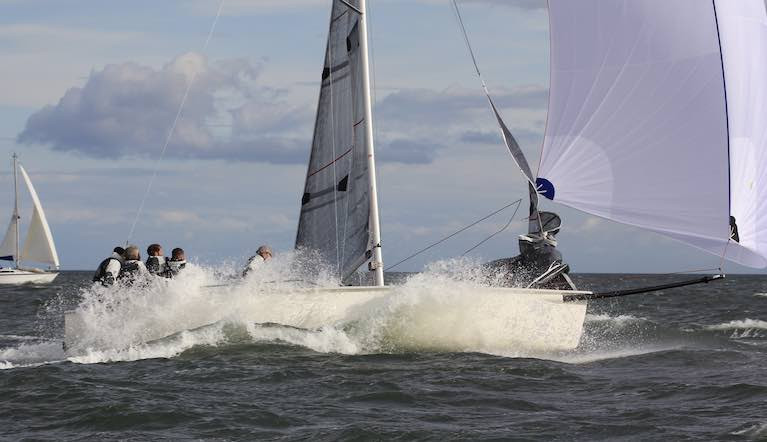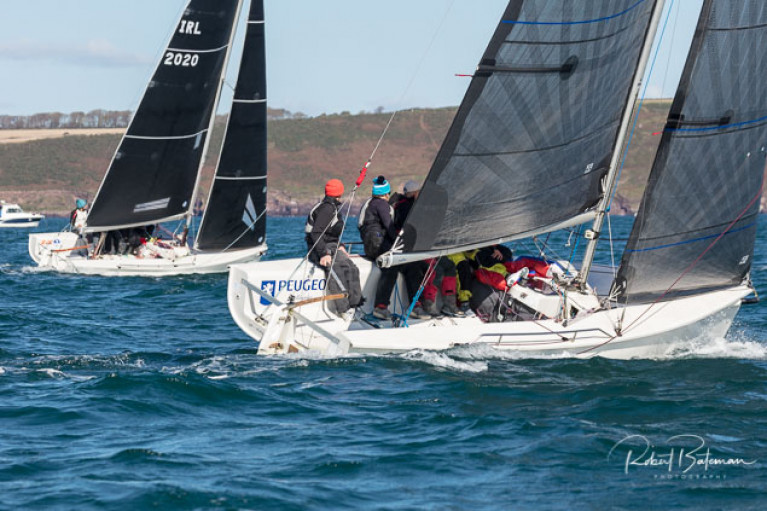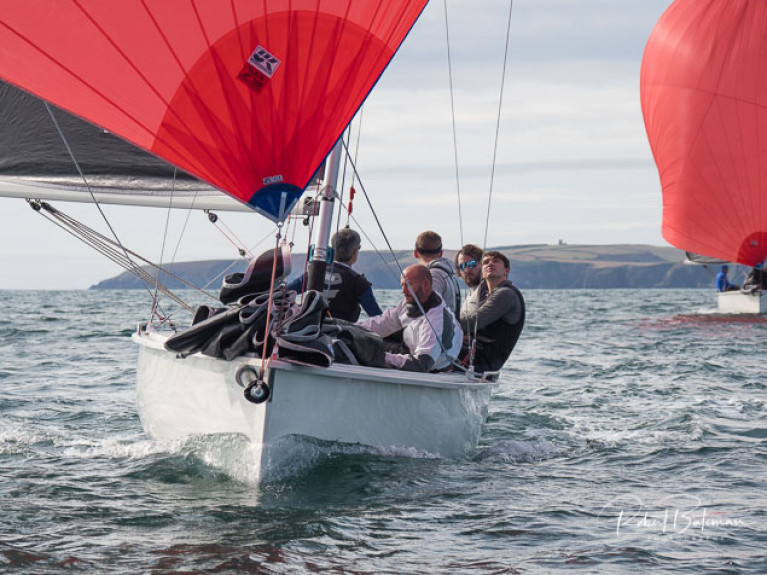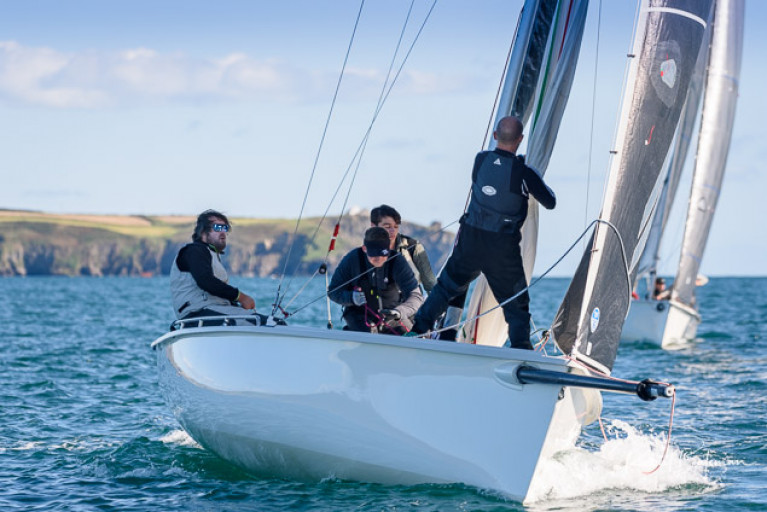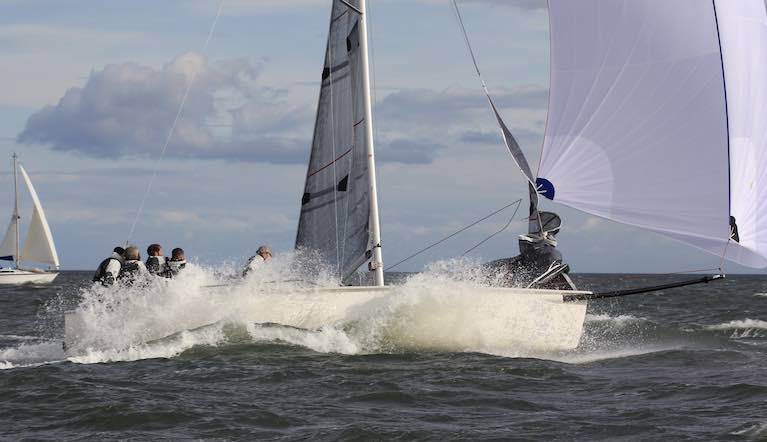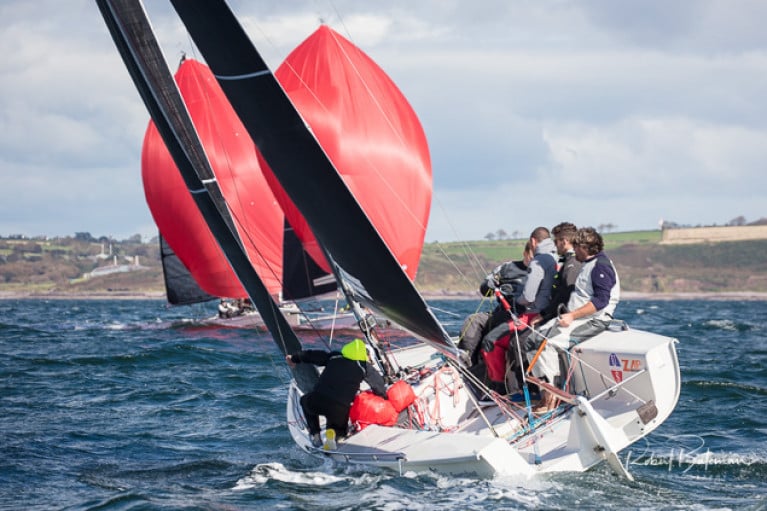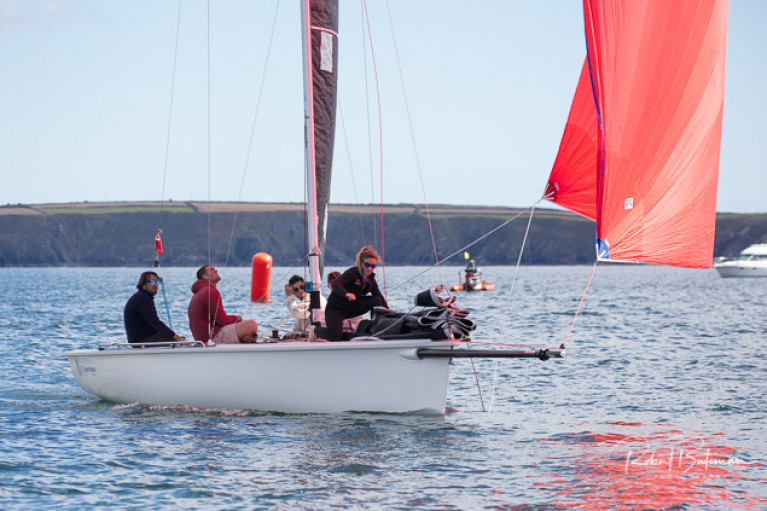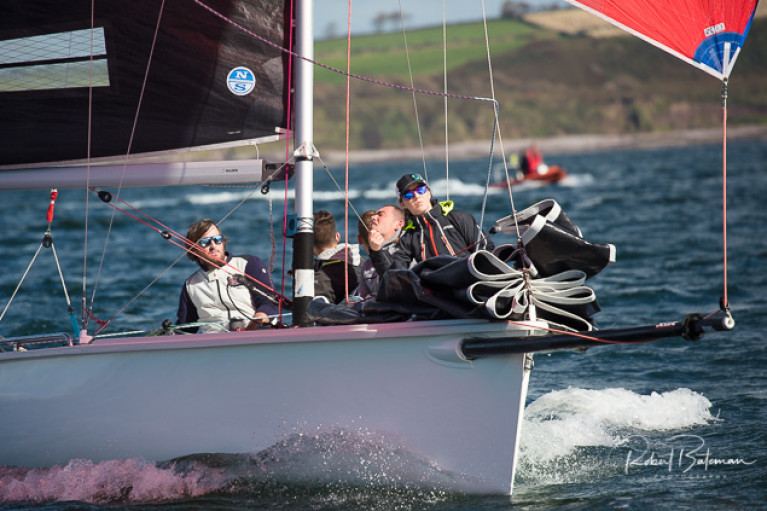Displaying items by tag: 1720
Local favourites at the first 1720 event of the year, the sportsboat Eastern Championships, will be “Atara” helmed by Howth Yacht Club's Ross McDonald as well as “Wet N Ready” helmed by another Howth ace, Dan O’Grady.
Despite the local challenge, however, it is hard to deny that the overall favourite going into the expected 15-boat event on July 10/11 will be “Dutch Gold” helmed by Rob O’Leary. As Afloat reported, O'Leary won all three of last seasons 1720 events.
The season was meant to start in May at the Sportsboat Cup in Dun Laoghaire but that was unfortunately postponed due to COVID as was the Class European Championships at Waterford Harbour in June that will now sail in September.
There is a plan for an informal 1720 training session on Friday, July 9th preceding the event, although final details are yet to be confirmed.
Download the Notice of Race below.
In the wake of government pandemic easing announcements last Friday, one of the first major one-design championships of the sailing season has been postponed with the news that the 1720 European Championships scheduled for Waterford Harbour Sailing Club on June 4th has moved to September.
Dunmore East Harbour was scheduled to host up to 30 1720 sportsboats from June 4th-6th, according to the club's Cruiser Captain Julian Hughes.
The government announcement permits training for sport in May but no competition until after June 7th.
In a statement released on social media last night, 1720 class captain Dave Love said "after careful consideration of the latest government announcement and discussion with all stakeholders, the decision has been made to postpone the 1720 European Championships in WHSC from the June bank holiday weekend to later in the summer".
The new date for the European Championships is 23-25 September.
Love also published revised dates for the remainder of the season
1720 class revised dates for 2021
- Baltimore Cup - 31 July to 1 August - Baltimore SC - club event racing Saturday to Sunday
- National Championships - 13-15 August - RCYC - racing Friday to Sunday
- Europeans Championships - 23-25 September - racing Thursday to Saturday
1720 Sportsboat 2021 Fixtures Start With Dun Laoghaire Cup in May
The 1720 Sportboat class starts its 2021 season next May in conjunction with the Royal Irish Yacht Club's Dún Laoghaire Cup Regatta on Dublin Bay.
As Afloat previously reported, next up for the Sportboat class is the European Championships on the June Bank Holiday weekend at Dunmore East Sailing Club.
The fleet stays on the south coast for its final two events of 2021 with the Baltimore Cup being held in West Cork on July 31st. 1720 National Champion Rob O'Leary will defend his title at Royal Cork in Cork Harbour on 26th September.
1720 Sportboat 2021 Fixtures
- Eastern Championships, in conjunction with the Dún Laoghaire Cup, 15th-16th May, RIYC, Dún Laoghaire;
- European Championships, June Bank Holiday Weekend (exact days TBC), Waterford Harbour Sailing Club, Dunmore East;
- Baltimore Cup, August Bank Holiday Weekend (31st July & 1st August), a club event being run by Baltimore Sailing Club;
- National Championships, 24th-26th September, RCYC, Crosshaven.
The 1720 sportsboat European Championships will be hosted on the Irish South Coast in 2021. The fleet will muster at Waterford Harbour Sailing Club after the disappointment of the cancellation of its 2020 event at Royal Cork Yacht Club due to the pandemic.
Dunmore East Harbour will host up to 30 1720s from June 4th-6th, according to the club's Cruiser Captain Julian Hughes.
As regular Afloat readers know, Robert O'Leary and the Dutch Gold crew completed a hat trick of wins at the Munster Championships, Baltimore Cup and the Southern Championships this year in Cork Harbour, so he is the form boat heading into the 2021 season highlight on the Copper Coast.
Baltimore O'Leary Brothers Win 1720 Munster Championships in Cork Harbour
Five race wins from eight races sailed at the 1720 Munster Championships gave overall victory to Dutch Gold skippered by Robert O'Leary sailing with his brother, Peter O'Leary, a double Olympic Star keelboat helmsman, as part of the Baltimore Sailing Club winning crew.
The win completes a hat trick of wins for the Dutch Gold crew after victory also at the Baltimore Cup and the Southern Championships.
Second was the brother's father, Anthony, sailing with a third son, Nicholas, aboard the Royal Yacht Club entry, Antix.
Third overall in the ten boat fleet was Dave Love's entry Mini Apple skippered by Sam Hunt.
O'Leary's 'Dutch Gold' Crew from Baltimore Take the Lead at 1720 Munsters in Cork Harbour (Photo Gallery Here)
The leaderboard of the 1720 Munster Championships hosted jointly by Monkstown and Baltimore Sailing Clubs has a familiar look to it with Robert O'Leary's crew in Dutch Gold on top after four races sailed yesterday.
O'Leary, who has won both Baltimore Cup and Southern Championship honours this season, now leads by two points from his father Anthony and brother Nicholas in second place sailing Antix. Nine points back in third place is Mia Murphy's Aquatack.
 Anthony O'Leary's Antix is lying second at the 1720 Munsters in Cork Harbour Photo: Bob Bateman
Anthony O'Leary's Antix is lying second at the 1720 Munsters in Cork Harbour Photo: Bob Bateman
It's a smaller fleet in Cork Harbour after what was meant to be the national championships was forced to change both its race track and event title due to COVID-restrictions.
Dublin boats did not travel in line with restrictions and as a result, the fleet is ten boats as opposed to the 14 that raced for Southern honours, also in Cork Harbour, in August.
Racing continues today.
 Racing is taking place in Cork Harbour instead of the originally planned Cork Harbour Photo: Deirdre Horgan
Racing is taking place in Cork Harbour instead of the originally planned Cork Harbour Photo: Deirdre Horgan
 1720 Munsters 2020 at Monkstown and Baltimore Sailing Clubs (Sailed: 4, Discards: 0, To count: 4, Entries: 10)
1720 Munsters 2020 at Monkstown and Baltimore Sailing Clubs (Sailed: 4, Discards: 0, To count: 4, Entries: 10)
1720 Sportsboats Day One Photo Gallery by Bob Bateman Here!
1720 National Championships Downgraded to 'Munsters' this Weekend at Monkstown Bay Sailing Club
This weekend's 1720 National Championships are to be downgraded to a Munster Championships in the wake of the recent government announcements that appeal to Dubliners not to travel outside the county.
As Afloat reported previously, the Championships had already moved from its original venue at Baltimore in West Cork over COVID and now the event will no longer be a 'nationals'.
The event due to be held now at Monkstown Bay Sailing Club in Cork Harbour will be amended to a two-day format on Saturday 26th & Sun 27th September.
Robert O'Leary has taken victories in August's 1720 Baltimore Cup and more recently in this month's Southern Championships, so if he and his Baltimore Crew can pull off another win, it looks like they will be unique among Ireland's one-design classes by being crowned 'Southern' and 'Munster' champions in the same season!
There is a plan for the 1720 class to say in Cork Harbour after the weekend and continue to race at Royal Cork Yacht Club's AIB Autumn League, as Afloat reported earlier here.
O'Leary Eyes Hat-Trick as 1720 Nationals Move to Cork Harbour for Joint Staging by Baltimore & Monkstown Bay Sailing Clubs
Robert O'Leary will be going for a hat-trick of 2020 1720 sportsboats victories later this month but not as originally scheduled, as the 1720 National Championships moves venue from Baltimore Sailing Club in West Cork to Monkstown Bay Sailing Club in Cork Harbour.
O'Leary won the 2020 Baltimore Cup a month ago and in the last weekend of August he won the Southern Championships at Royal Cork Yacht Club, so he and his Dutch Gold crew will quite rightly see the defence of the 1720 title as a crowning glory of the 2020 season.
However, he won't have it all his own way with a potent Ross McDonald crew of Howth biting at his heels. McDonald lost on countback at the Cup and was tied on points overnight after day one of the Southerns.
In a notice to competitors issued this month, Baltimore's Committee told competitors that 'after reviewing the current government guidelines and seeking guidance from the local businesses in Baltimore, we as a committee feel that we cannot provide the same level of racing and entertainment as experienced in the Baltimore Cup this year'.
 1720s return to Cork Harbour on September 25th Photo: Bob Bateman
1720s return to Cork Harbour on September 25th Photo: Bob Bateman
The West Cork club hopes to welcome the fleet back to Baltimore in 2021.
After discussions with Monkstown Bay Sailing Club, the 1720s have agreed to run the event in Cork Harbour on the same dates - 25th, 26th, 27th September 2020.
It will be a combined effort between the two clubs as both are of the opinion that the event should not be cancelled this year provided it can run it in line with the Covid-19 government guidelines.
It is the intention to launch, berth and recover boats in the Crosshaven River, with the primary race area being South East of the Harbour.
O'Leary's Dutch Gold Crew from Baltimore Win 1720 Southern Title in Style (Updated)
Robert O'Leary's Dutch Gold Baltimore Sailing Club crew add the AIB Southern Championship title to their 1720 sportsboat trophy haul after an emphatic six-point win at Cork Harbour today.
O'Leary counted a tally of eight results inside the top four to win the Royal Cork Yacht Club hosted event. The Cork ace had one poor result scored in race eight today where he finished 12th, a result that he later discarded.
The winds for the 14-boat championships came in like a lion for the opening races on Friday with some big breeze but then went out like a lamb as forecast today with the final two races sailed in light airs. O'Leary however, managed to prove himself across the wind range by making a strong recovery in today's final race nine to win it, his fourth race win of the weekend.
Second overall was Royal Cork's T-Bone (Durcan/O'Shea). Third was the Royal Cork and Howth Yacht Club entry Ropedock/Atara (Ross McDonald/English) who held second place throughout the championships until a disqualification from the final race.
 1720 Southern Championships Results Overall
1720 Southern Championships Results Overall
1720 Southern Championships at Royal Cork Yacht Club Day Three Slideshow
Baltimore's O'Leary Crew Build Lead at 1720 Southern Championships
The overnight AIB 1720 Southern championships leader Robert O'Leary has built a five-point winning margin after five more races were sailed today at the Royal Cork Yacht Club hosted event.
The Baltimore Sailing Club crew sailing 'Dutch Gold' are putting in a consistent performance, similar to that of three weeks ago at the 1720 Baltimore Cup which they won on countback against O'Leary's father, Anthony.
 Tight racing for Southern Championships honours in the 14 boat 1720 sportsboat fleet Photo: Bob Bateman
Tight racing for Southern Championships honours in the 14 boat 1720 sportsboat fleet Photo: Bob Bateman
Dutch Gold has not been outside the top four in any of the seven races sailed so far this weekend. Today, the West Cork sailing team earned four top three results (and two wins) from five races sailed in the 14-boat fleet.
 Conditions were not as windy as Day One but there were still some big gusts. Photo: Bob Bateman
Conditions were not as windy as Day One but there were still some big gusts. Photo: Bob Bateman
Staying second overall, Howth Yacht Club's Ross McDonald in Ropedock -Atara trails by five points and is a similar margin ahead of third-placed T-Bone (Tom Durcan/).
Racing continues tomorrow and the forecast is for lighter winds.
1720 Southern Championships Overall after Seven Races Sailed



























